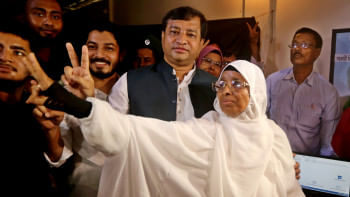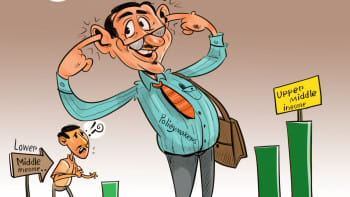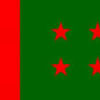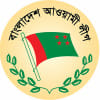Time for AL to do some soul-searching

Whenever a crisis hits the ruling party, most of its leaders remain unfazed because they think, "Our leader is there; she will take care of it." But what happens when the party supremo doesn't get involved? Case in point: the Gazipur city polls.
Over the past decade, the ruling Awami League leaders have been busy bashing the BNP, holding programmes to counter the opposition parties and publicising the government's development activities, without spending much time to streamline the organisation itself. The party leaders were only concerned with delivering and circulating their own narratives, not listening to the people's voice.
Elections are a way for the party in power to gauge people's reactions on their policies and deeds. Have the voters been able or permitted to convey their responses to the government through the voting system that has developed over the decade? In the absence of opposition parties, especially the BNP, the ruling AL did not take the elections – local and national – as seriously as they should have. The party may have won those elections, but they failed to capture people's pulse.
Voters also did not have many options when casting their votes, as the candidates were either from the ruling party or its dissidents. This led the AL leaders to rest easy thinking that "whoever wins is one of ours."
Infighting within the party has grown over the years, leading to the Awami League becoming its own rival at the grassroots level. Its grassroots leaders' desperation to gain a position of power or cling to it widen the rift within the party every day.
Being elected unopposed, another ominous sign for democracy, has also become a regular phenomenon in the country in recent years. This has further fuelled the perception that anyone participating in an election on a ruling party ticket would win no matter what, which has led to widespread apathy among both the voters and prospective candidates from other parties, keeping them away from participating in the democratic process.
Take the seven-phase union parishad elections in 2021-2022 for example.
On Saturday, at a programme in the AL's Bangabandhu Avenue headquarters, General Secretary Obaidul Quader said democracy had won in Gazipur, and the Awami League did not interfere in the polls to make its candidate win. The ruling party second-in-command also said the people of the country were happier to see a free and fair election in Gazipur than they would have been seeing an AL candidate win.
The unofficial results of 4,027 UPs in seven phases showed that the ruling party nominees for chairman won in 2,172 UPs, and independents won in 1,778. Party insiders said most of the winning independents were disgruntled AL leaders who contested after failing to get party nominations. Meanwhile, elections to the chairman posts in 369 UPs were not required as candidates were elected unopposed; of them, 368 were AL ticket holders.
This has been a common scenario in almost every election over the past decade or so. Some 153 candidates were elected unopposed in the 10th parliamentary election on January 5, 2014, when the BNP-led 18-party alliance boycotted the polls.
This disturbing trend of "elected unopposed" has led the ruling party men to get embroiled in a rat race of winning the "party ticket," instead of putting efforts into wooing the voters. Considered by many as the master of "vote politics," AL is now mostly dependent on law enforcers and bureaucrats to win over the battle with its candidates choosing to maintain close contact with the local administrations instead of the voters.
This practice, which has been an open secret, has recently forced the AL supremo to tell her party leaders that party tickets will not guarantee their win in the upcoming general polls, and they will have to win by dint of their popularity and merit. She categorically said that the election would be more challenging than the previous ones, and it would be participatory.
On May 7 last year, at a meeting of the Awami League Central Working Committee, the highest decision-making body of the party, the AL chief criticised some of her party leaders, saying those who are not confident about their win don't want the BNP to take part in the national polls.
This statement says many things.
The UP election was a wake-up call for the ruling party, but the AL didn't take enough measures to resolve its infighting. Initiatives by the ruling camp were only limited to threats of blocking nominations and party posts, some expulsions, and later granting amnesty to them.
The Gazipur city polls have, once again, exposed how badly the internal feud is impacting the AL, with the general elections only months away. The results in Gazipur stressed the need for some soul-searching within the party. But will the AL do it seriously?
The possibilities are slim, as a day after the election, a top party leader asked not to discuss the issue at the party president's Dhanmondi office.
However, party chief Sheikh Hasina, on Sunday, met with with Azmat Ullah at her Gono Bhaban residence, where she asked him the reason behind his defeat in Gazipur.
On Saturday, at a programme in the AL's Bangabandhu Avenue headquarters, General Secretary Obaidul Quader said democracy had won in Gazipur, and the Awami League did not interfere in the polls to make its candidate win. The ruling party second-in-command also said the people of the country were happier to see a free and fair election in Gazipur than they would have been seeing an AL candidate win.
The first part of his statement begs a pertinent question: does the Awami League interfere in the election process to make its candidates win? And lastly, he deserves kudos for his (belated) understanding of what makes people happy: a free and fair election.
Partha Pratim Bhattacharjee is planning editor at The Daily Star.

 For all latest news, follow The Daily Star's Google News channel.
For all latest news, follow The Daily Star's Google News channel. 










Comments